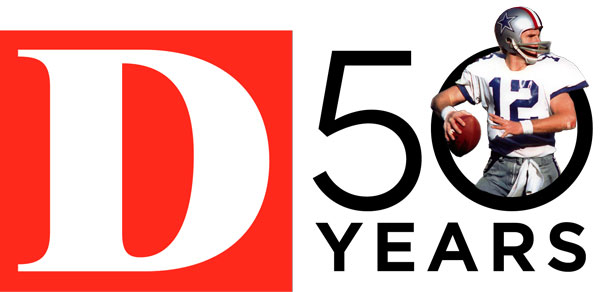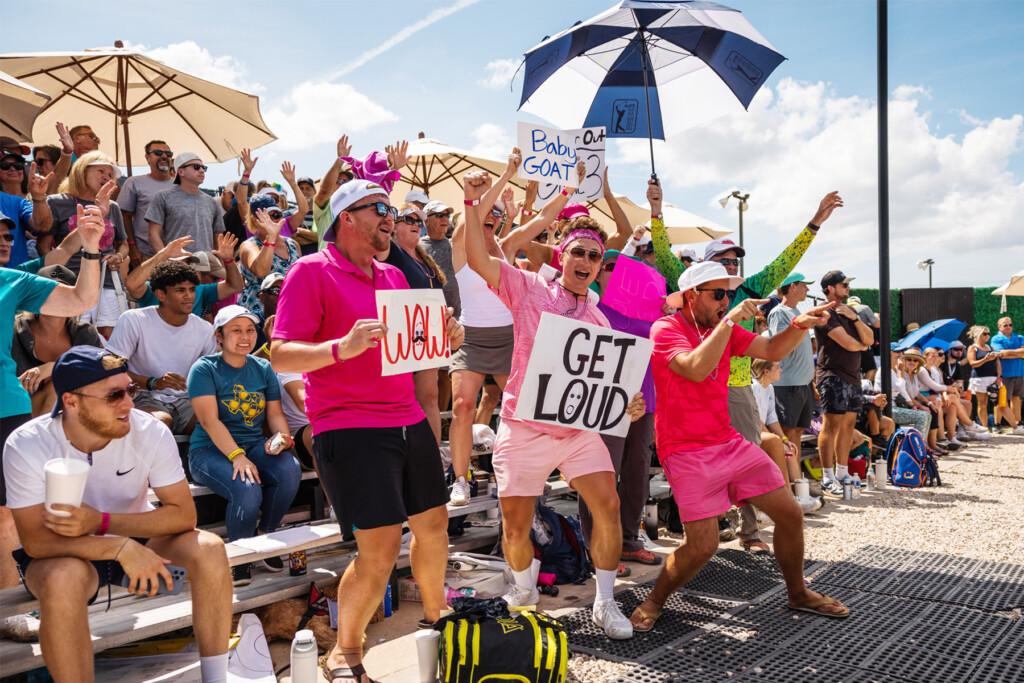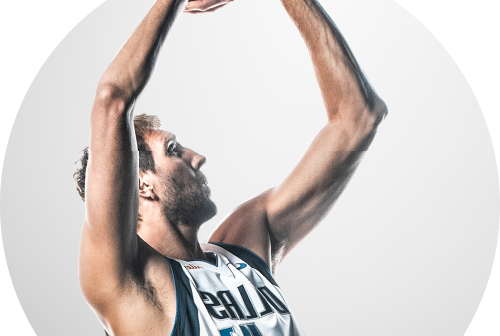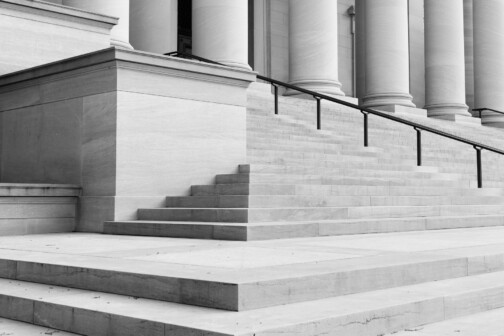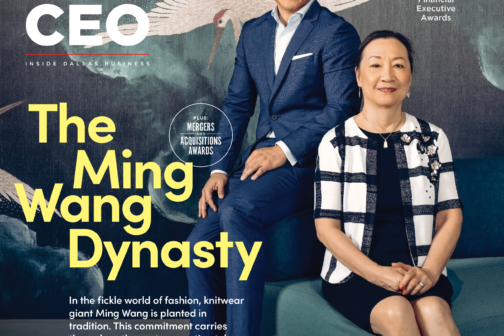
Dallas billionaire Tom Dundon is a fist-bumper, not a hand-shaker. He’s also early. Which means I’m flustered from the get-go because not only do I flub the surprise bump, but I don’t have a conference room reserved because I didn’t think he’d agree to an interview and now not a single room in the D Magazine offices is free. The chairman of Dundon Capital Partners and owner of the NHL’s Carolina Hurricanes is unfazed. He suggests that we walk over to the new Professional Pickleball Association headquarters on the fifth floor of the downtown high-rise he owns two blocks away. Thankfully, today my heels are wedges.
Dundon is casually dressed in a logoless gray t-shirt, navy shorts, and a baseball hat. The fit 52-year-old looks like he could be headed to or coming from the gym. But as I’ll learn, Dundon isn’t a treadmill kind of guy. He’s an intense competitor who, while working on his fitness, prefers to challenge the best and win, or at least get substantially better. Which is why, when he started to enjoy a new racquet sport, he didn’t just convert the tennis courts (indoor and outdoor) at his Preston Hollow home into pickleball courts, he invited John Isner (recently retired local tennis star and friend) and Ben Johns (the best pickleballer in the business) over to play. Then he essentially bought the sport and changed the entire nature of the game. Come November, he will officially crown Dallas its mecca when the USA Pickleball National Championships come to Brookhaven Country Club for the largest pickleball event in the surprisingly long history of the world’s fastest-growing sport with the silliest name and most annoying sound.
But for now, the fifth-floor locus of pickleball domination is still a work in progress. The space formerly housed a healthcare company, on whose board Dundon sits, until it grew too big and moved to higher floors. The vacated floor is still mostly empty except for bundles of disconnected wires and piles of t-shirts that pool on carpet once inhabited by work stations. Around a corner, a small bank of occupied desks is situated in front of a full-size pickleball court. At the moment the court is empty, but I suspect it is often in high demand by the staff, many of whom are recent Utah transplants who seem a little wilted by the three-digit heat of their first North Texas summer.
Early last year, Connor Pardoe, the founder of the PPA, sold his operation for an undisclosed sum to Dundon, who moved it—and many of its employees—from Salt Lake City to Dallas. As we walk past Pardoe’s office, he steps out to say hello. Dundon asks if he can help him find some pickleball paddles and the right-size Yeti water bottle that his wife, Veruschka, needs before they head to Aspen later that day for vacation. Then we walk into a conference room and sit down.
“If you guys weren’t in Dallas, I would never do this—I don’t want any attention,” Dundon says apologetically as he turns his phone facedown on the table. “Matter of fact, I’m hoping when this is all done, that you pull me as far out as you can and do it more about pickleball and the guys and nationals, all that. I can’t tell you what to do, so you’re going to make your choices. But I’m not interesting, you know what I mean?”
I absolutely do not know what he means.
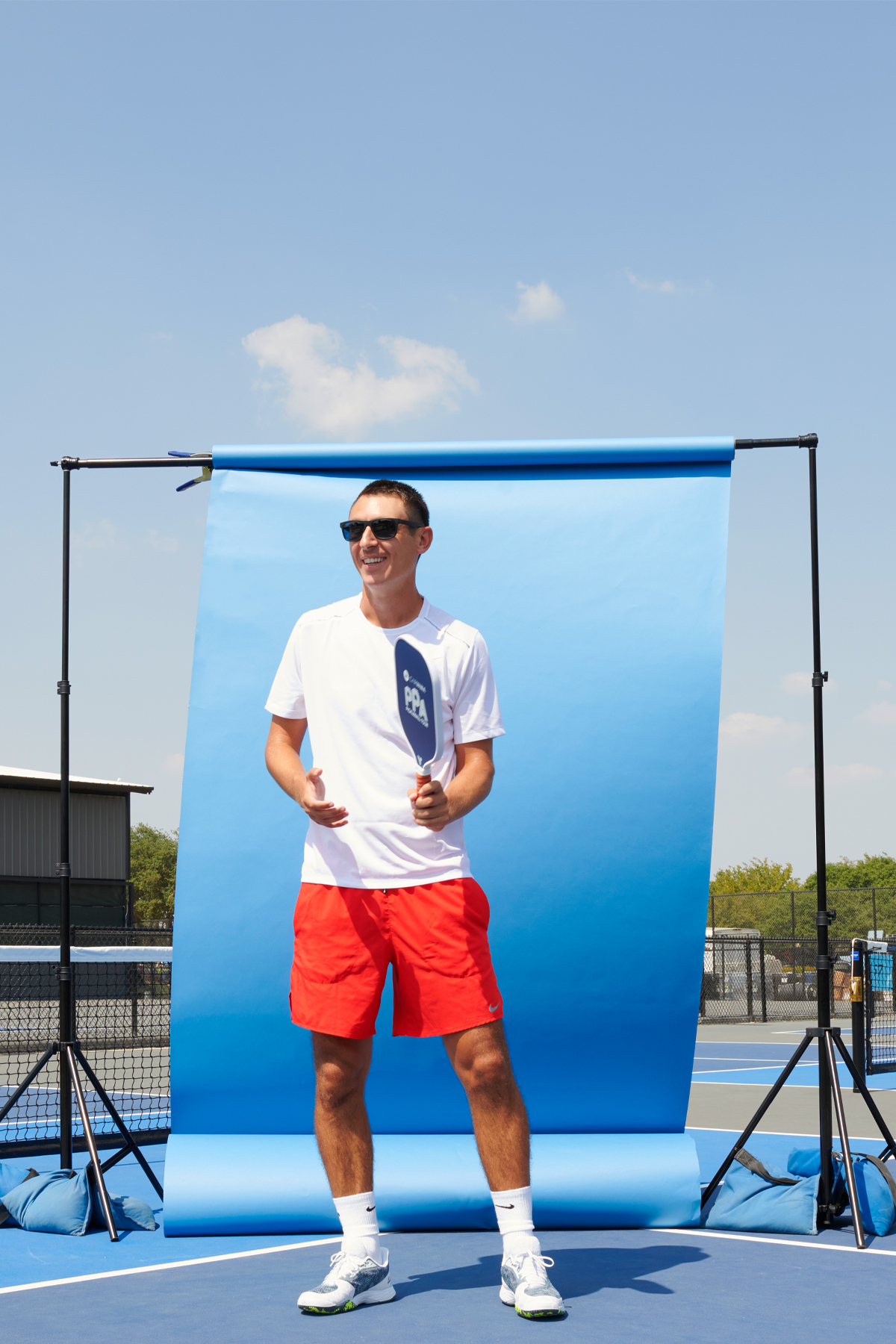

The origins of pickleball aren’t that different from one of ChatGPT’s first problem-solving tests: to balance a laptop, a book, nine eggs, a bottle, and a nail. In the summer of 1965, two golfer dads (one a Washington state legislator and later lieutenant governor) faced a similar conundrum. Trapped with their families on sheep-dotted Bainbridge Island near Seattle, they were bored. Their prompt: devise a game the entire family can play with a paved badminton court, a badminton net, some table tennis paddles, and a Wiffle ball.
The answer, after some tinkering, is what some tennis players mockingly refer to as The Devil’s Ping-Pong. The playing surface is essentially a quarter of a tennis court with a lower net. Equipment consists of oversize table tennis paddles and yellow, perforated plastic balls that are bigger than baseballs but smaller than softballs. As for the origin of the name: the cuter but debunked story is that it was named for Pickles, the cockapoo puppy of one of the founders, when in fact the dog was named for the sport. The truer but more inexplicable story is that “pickleball” is a reference to “pickle boats,” aka mismatched rowing crews.
Instead of tennis service boxes, there is one rectangle at the front of both sides of the court called the “kitchen.” To protect small children and grandparents, you cannot stand in the kitchen and hit killer volleys at them; instead, you must stand behind the kitchen to volley. If the ball bounces in the kitchen, only then can you step within it to hit the ball.
This creates a high premium for a slightly ridiculous shot: the dink. The dink is most effectively returned by another dink, preferably at a more and more extreme angle. Serving is underhand, and you can win points only on your serve. Games are played to 11 points; you must win by two. Matches are the best two out of three games.
The year before the sport was officially incorporated in 1972, Dundon was born in New York City. He says he grew up poor but not poor, which is to say his family had a roof over their heads but they never went out to eat. When he went to SMU for college, his sole goal was to make it in business. His first venture was Izzy’s, a Fort Worth burger joint that developed a reputation for its cheese fries but folded within a year. Over the next two decades, he built a fortune, starting with a company that offered car loans to people with bad credit. His bet on the margins paid off brilliantly. When the car loan company went public, in 2015, his exit deal was worth an estimated $1 billion. (It was later reduced to $700 million.) That same year, he founded Dundon Capital Partners and bought the 33-story building at 2100 Ross Avenue to house it.
These days Dundon’s focus isn’t so much on making money as it is on making money in a way that interests him. Sure, he’s kept his hands in standard fare such as auto finance and healthcare, but he started branching out into sports in 2011 when, inspired by his two young sons, he invested in Dallas-based Topgolf. (After a merger with Callaway Golf, the entertainment monster is now valued at about $4 billion.) In 2017, he helped bankroll the Trinity Forest Golf Club. He became the majority owner of the Carolina Hurricanes in 2018; by 2021, he was the sole owner. In February 2019, he agreed to invest in the Alliance of American Football. That last one ended disastrously. A few short months after Dundon sank $70 million into the endeavor, the league declared bankruptcy; lawsuits are ongoing.
But this time Dundon hasn’t bought an entertainment venue or a golf course or a team or even a league. He’s bought a pro tour and the infrastructure that makes it go. He’s trying to cure the ills of tennis by limiting the volume of professional players and having them play across more events in the hopes of developing those players—ideally more quickly—into stars. He’s elevating events to NASCAR-level entertainment, only with the added equivalent of letting amateurs race on the same track. He’s bringing in the noise. He’s banking on the funk.
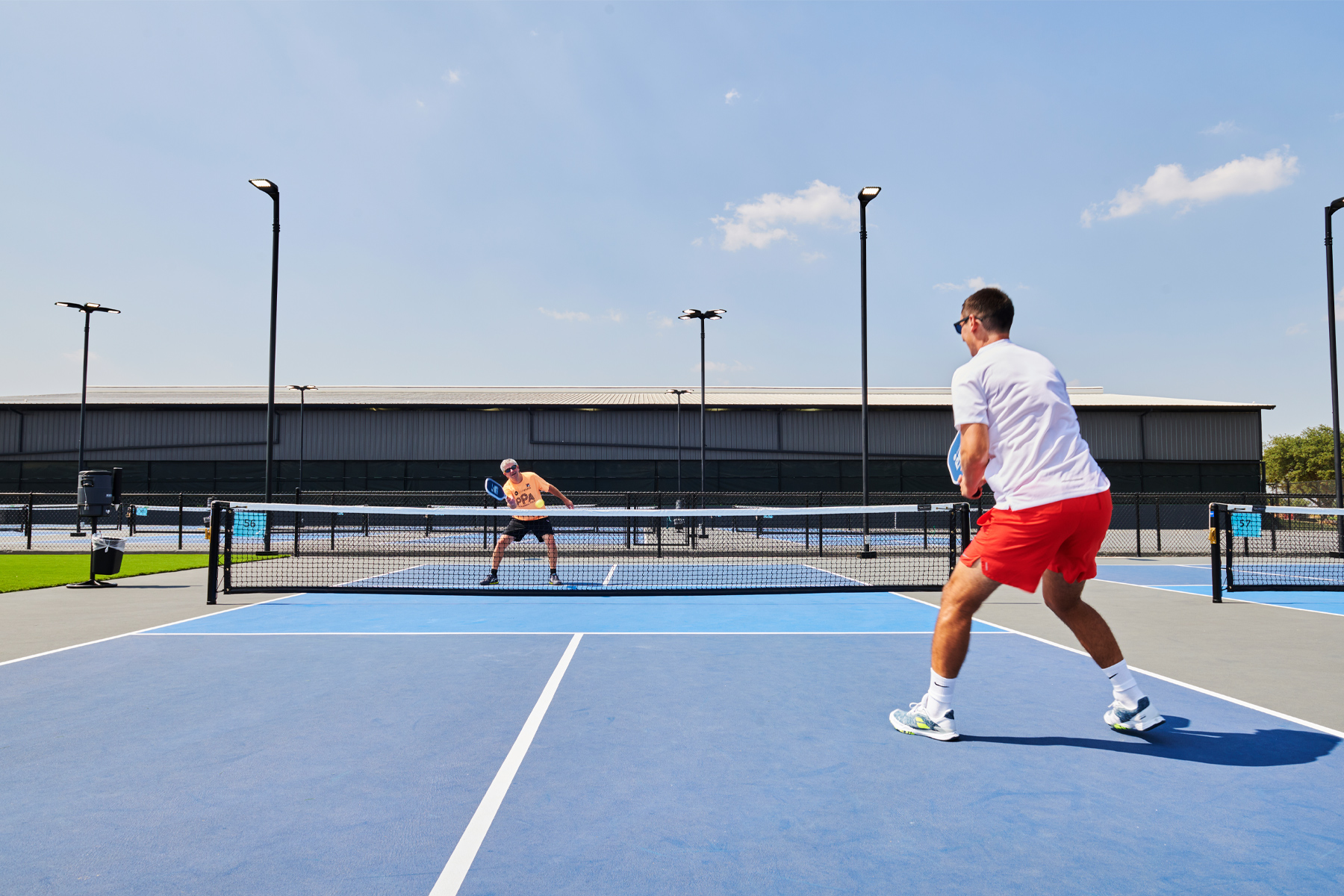

Dundon credits his initial investment in pickleball to PPA broadcaster Dave Fleming. Fleming credits it to Tiger Woods’ former swing coach.
Before Fleming became known as “the voice of pickleball,” he was the director of marketing for Plano-based Dr Pepper. Then there was a bit where he was a stand-up comedian and corporate teambuilder. Now, dressed in a short-sleeve polo shirt and surrounded by Pittsburgh Steelers gear in his PPA office, he looks less business casual and more Lake Dad, the kind of guy who knows his way around a grill and has “nice” flip-flops for going out. In fact, the 56-year-old former collegiate club tennis player is now a pickleball pro on the senior tour.
Four years ago, at a tournament in Palm Springs, he found himself riding in a golf cart on his way to a match with Hank Haney, former Westlake resident and Tiger Woods’ aforementioned swing coach, who was also playing in the tournament. When Haney discovered Fleming was from Dallas, he asked him if he knew Dundon. “I don’t know him, but I’m a huge hockey guy, so I know who he is. But I don’t run with that set,” Fleming said. Haney told him Dundon, who had started playing pickleball on vacation, was looking for competitive games in Dallas but hadn’t found any. Would Fleming mind if he gave Dundon his phone number? Fleming didn’t mind at all.
Dundon called Fleming in short order, and the two agreed to meet at Wagon Wheel Tennis and Pickleball Center in Coppell. Fleming brought two other really good players, and Dundon was impressed. “He always played with his buddies and hadn’t seen the pro levels that were there,” Fleming says. “So he wanted to play more and more. He loves the sport. And so it just kept being a progression of Tom getting better, different players playing with Tom, and, you know, friendship. Then all of a sudden he’s like, ‘I should have courts at my house.’ So we helped him with that. He’s a very good player now—a very good player. And it was a wild ride for someone who loves hockey, like me, to be interacting with an owner of a team and helping him along.”
The ironic thing is that what fueled Dundon’s love of the game—an extremely competitive, private nature plus access to top players and courts of his own—is the exact opposite of what drove pickleball’s astronomic growth from nearly 3.5 million players in 2019 to more than 36.5 million today. (For comparison, tennis, which has been around in one form or another for about 500 years, reached a U.S. participation high of 23.6 million last year.) Pickleball’s growth can be attributed to a few distinct factors: the necessary equipment is minimal and cheap, public courts are now plentiful, the rules are relatively easy to learn, players of different levels can be equalized, and—most important during the course of a pandemic—you can play it outdoors. Plus, it’s social in a way that even tennis isn’t. You don’t have to join a club or a team or know three people who are the same USTA or UTR rating and have the same time free for a round of doubles. You just have to show up where people are playing and put your paddle in the queue.
“One of the hard parts about pickleball is you go to a park, you wait in line, and you have to be polite,” Dundon says of the sport’s proletarian appeal. “I prefer to have a set game with a set amount of time, which isn’t actually how pickleball really grows. It grows because people go and they’re social. I’m not social in that way—I wish I was.” He laughs. “I would never go somewhere just to play with a bunch of people. But I think what’s great about pickleball is that’s what happens. And that’s why it’s organically growing so fast, because everybody can do it, and people like to hang out. If you look at Starbucks or whatever, you see the way people just want to be together. And pickleball is pretty good for that.”
Playing on your own court with people you know might not be the best way to make new friends, but it’s a great way to discover new business opportunities. During one such game, Fleming brought up the fact that the owners of Pickleball Central, the sport’s largest online retailer, might be interested in selling. Dundon didn’t really want to buy a website, but he was intrigued enough to feel out a deal. Then COVID hit, and things fell through. “So obviously I should have done that [deal],” Dundon says. “That’s how smart I am. Pickleball goes even more crazy.”
Meanwhile, UNC-Chapel Hill tennis player Zach Hunter, the son of one of Dundon’s friends, had taken advantage of lockdown to start TopCourt, an online subscription service that offers tennis training videos from top players. He told Dundon that he was interested in branching out into pickleball videos, but he didn’t know any pro pickleball players. At the time, Dundon didn’t either. So he told Fleming that when the pro tour was in town, he wanted to meet Ben Johns—the best player in the world and the only name he knew—so he could connect him with Hunter.
Fleming brought Ben and his brother Collin, one of the best doubles players in the world, over to Dundon’s house. Ben was barely 21 years old, about Dundon’s size at just over 6 feet, smart, and at the top of the game. Dundon, who had just spent the previous decade becoming intimately acquainted with pro athletes across a spectrum of sports, suddenly saw something he had never associated with pickleball: a star. And stars, he firmly believes, are what grow sports.
Dundon switched gears. If, in addition to buying the retail arm that sells all the gear, he bought the pro tour and the tournament software that has a 90-plus-percent market share—and if he prioritized rebuilding the 30-year-old technology, getting matches broadcast on ESPN, and bringing in major national sponsors to substantially increase the prize money—then he might be onto that rare bird: a moneymaking proposition that he found truly interesting.
“There was the idea that with Tom’s connection and passion for pickleball, maybe there’s a way—if it could all come together—to really elevate the sport,” Fleming says. By the end of 2022, that’s exactly what happened: Dundon had bought and combined the Pro Pickleball Association, Pickleball Central, and pickleballtournaments.com under one roof. And that roof, by default, was in Dallas.
“To go from six years ago, when the best players played on the tile floor at the Salvation Army in McKinney, and you had to get a special secret invite to get there, and now, fast forward to the hub of the pro tour and some of the biggest brands, and then the national championships, which is going to be the biggest tournament in the history of the sport, are all right here in our backyard,” Fleming says. “I’ve lived in Frisco for over 20 years, so it’s unbelievable to see that and to see just the impact the sport can have on our city.
“I don’t know what would’ve happened if I had gotten on a different golf cart.”
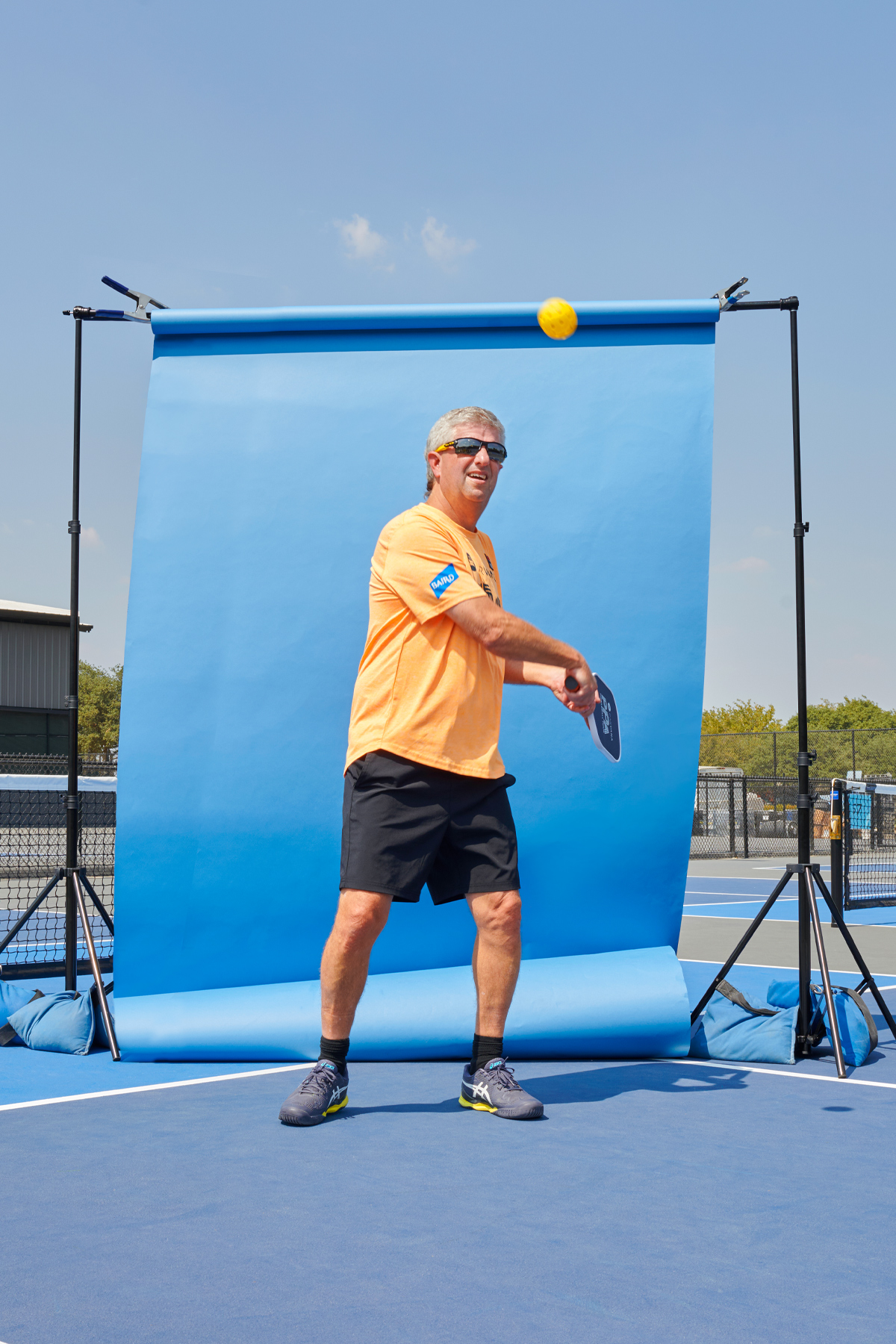

Connor Pardoe met Dundon at the end of 2021, sometime after Ben Johns pulled him aside at the championship event in Las Vegas and showed him Dundon’s Wikipedia page. “At the time,” the 29-year-old cofounder of the PPA says, “so many people were coming to us, wanting to invest, wanting to buy the tour, wanting to be a part of pickleball because it was really starting to boom.” Pardoe wasn’t interested in selling, but then Dundon shared how he thought the PPA could be so much more than the pro tour. “I quickly found out his vision for unifying the sport as a whole,” Pardoe says. “I remember Tom said to me, ‘You know, we’re in a unique position where we can bring everything into one central place and really help pickleball grow the right way.’
“No other sport has had the opportunity to really do that. You look at golf today, tennis today—those individual sports are so fragmented. Different people own different things. There are different rules. Tom made a really large investment into the sport of pickleball. I was like, ‘This is great. I want to be a part of it.’ ”
Pardoe came to pickleball by way of his family’s Utah-based real estate development firm. He was responsible for its 55-and-over portfolio. Because he comes from a big collegiate tennis family, he thought he’d put a tennis court in the middle of one of his properties. But it wouldn’t fit.
“My aunt had been playing pickleball, and we’d been giving her shit about the name and the sport for a while,” Pardoe says. “She was an early pickleballer, probably started in 2016. And so I called her. I was like, ‘Hey, so how big is that pickleball court again? Is it really a fourth of the size of a tennis court?’ She said, ‘Yeah.’ ” She had converted the tennis court at her house to pickleball, and she told Connor he should make the 15-minute drive and come over to play. Connor, like so many, played once and was hooked.
When he invited his dad to play, the lightbulb went on. They couldn’t play tennis together because their skill levels were too different, but they could play pickleball. “Quite frankly, he was better at pickleball than I was,” Pardoe says. “It was just so fun to have somebody that’s in their 50s playing with someone in their 20s.”
While checking on one of their development projects in Atlanta, the two came across a pickleball tournament with 500 players and a $20,000 prize. “I remember sitting there with my dad, and we’re having more fun watching pickleball than we did tennis at the U.S. Open a couple of months earlier,” Pardoe says. “When we left, I was like, ‘Why don’t we just put on two, three, maybe four tournaments? We could pay out $50,000 an event. I think we can cover it just by entry fees. And I think it would be a lot of fun.’ ”
He co-founded the PPA in 2019, envisioning it as being to pickleball what the PGA is to golf, but with one revolutionary distinction: an amateur tournament would be held alongside every pro event.
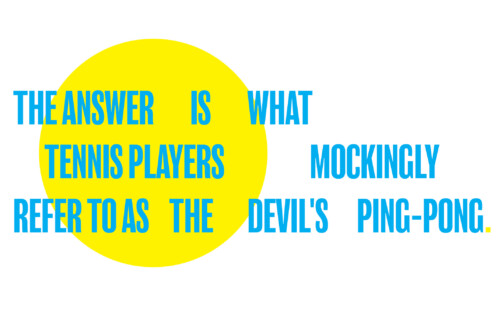
“It doesn’t matter if you have zero athletic ability or a whole bunch—there’s a spot for you. There’s a division for you,” Pardoe says. “You can come out and have a good time. So come play in a bracket—it’ll probably be somewhere between eight to 24 teams in your bracket—and then hang out, get a beer, enjoy the atmosphere, and watch Tyson McGuffin and Ben Johns and the best players play. So that’s what we’re going for: come and play your own thing, but also watch the best players in the world play at the same time.”
They are up to 25 events this year, including the national championships at Brookhaven in November. Pardoe says most of pickleball’s growth in North Texas has been from 2018 to now. “It seemed like the whole state of Texas—Dallas in particular—was moving kind of slow compared to other spots,” he says. “Utah’s a really big hotbed; Southern California is a very big hotbed. Arizona’s a very big hotbed. Florida. But post-pandemic, we haven’t seen any growth larger than in the state of Texas. It is absolutely going crazy. It’s probably our second-largest market now.”
DFW Airport made the choice of Dundon’s hometown to house the PPA and host the national championships a no-brainer. “Everyone’s relocated,” Pardoe says. “This is the mecca. This is why Dallas was chosen.”

Dallas’ domination of the sport, however, is no longer a foregone conclusion.
Back in 2019—while Pardoe was founding the PPA and Chicago tennis pro Ken Herrmann was founding the mirror-lettered Association of Pickleball Players (APP)—Austin-based hedge fund billionaire Steve Kuhn was envisioning Dreamland, a live music and art venue in Dripping Springs. When the pandemic hit, Kuhn, who had become an avid recreational pickleball player, decided to modify the venue into an 86-acre entertainment destination with outdoor activities conducive to social distancing, including pickleball.
At the end of 2021, when Dundon was finalizing his purchase of the PPA and working to make the APP irrelevant by executing multiyear contracts with the country’s top players, Kuhn was pursuing his own vision: Major League Pickleball. From a fan perspective, MLP is to the PPA what the Davis Cup is to the U.S. Open. It’s based on teams, not individuals. The league got its initial flash by promoting celebrity owners as opposed to players, who are still mostly unknown outside of the pickleball world. There are currently 24 MLP teams based around the country with such disparately famous owners as LeBron James, Heidi Klum, and Brené Brown. North Texas is unusual in that it is home to two teams: the Dallas Pickleball Club, whose owners include Mark Cuban, Dirk Nowitzki, and John Isner; and the Frisco Pandas, whose owners include the guys from Dude Perfect and Dak Prescott.
The problem on the billion-dollar playground was this: Dundon had exclusive contracts for his players, who were the best in the world, and, because they were the best in the world, Kuhn wanted them to play in MLP events. So Kuhn came to Dallas to have a chat with Dundon. A 2022 article in Sports Illustrated described the “tycoon tête-à-tête” as devolving into a scene from The Godfather.
“The true story is more boring,” Dundon told me when we met back in June. At the time, he believed that he and Kuhn had reached a satisfactory agreement to avoid mutual destruction. Dundon would abandon his plans to launch his own competing team league called Vibe, and PPA players would be allowed to participate in MLP events, which would be scheduled to avoid conflicts. Kuhn was named the Chairman of Professional Players for the PPA, and Dundon became the owner of the Seattle Pioneers MLP team. Va tutto bene.
Then, just as D Magazine was going to press, in late August, Pardoe discovered a horse head in the bed. Apparently Kuhn, who didn’t respond to a request for a comment, went behind Dundon’s back and offered dozens of top players “life-changing” amounts of money in return for multiyear exclusivity contracts. The players reportedly had one day to decide. Pardoe told Yahoo Sports that he immediately hopped on a flight to a PPA tournament in Kansas City to try to convince players who weren’t already committed to sign with the PPA.
On August 26, if you were following The Dink Pickleball on social media, you would have witnessed a weird pseudo-draft as signings were reported in real time. The PPA had already secured Ben Johns and Anna Leigh Waters; they also added former tennis pros Sam Querrey, Donald Young, and Jack Sock. The MLP managed to score Tyson McGuffin and Riley Newman. By early September, the MLP had signed nearly twice as many players as the PPA, and confusion over the state of the pro sport had never been greater.
I asked Jeff Watson, the vice president of communications for the PPA Tour, if Dundon planned to keep his MLP team. He didn’t have an answer. Pardoe didn’t return my calls.

The USA Pickleball National Championships, held at Brookhaven Country Club in Farmers Branch November 5–12, will be the largest pickleball event in the history of the sport. Organizers expect 10,000 applicants for half that number of amateur slots. The top PPA pros will face off in singles and same-sex and mixed doubles matches. Golfing Green Drive will be shut down to create Pickleball Boulevard. There will be fireworks, concerts, and a Guinness World Record attempt for longest match. There will be ladder matches, Queen of the Court games, and pro clinics for attendees. There will be food trucks, pizza ovens, and bars. And if Jonathan Fralick has his way, there will be nothing tennis-y about it.
“I hope pickleball does not move in the direction that tennis has, being exclusive. I like the louder crowds; I like the food trucks,” says Fralick, the vice president of racquet sports for Invited (formerly ClubCorp), the parent company of Brookhaven Country Club. “Most players play pickleball in their recreational space with their friends, and a lot of them have not seen the pros play. Watching pickleball on TV takes some time, right? It takes time to be able to settle in and watch it. People are going to see the pros playing. They’re going to see the high-level amateurs playing. And they’re going to be playing with the music and everything that’s activating around it.”
Fralick and the Invited team had 155 days to complete the $5.5 million transformation of Brookhaven. The south side of the tennis facility, which had already been partially converted to pickleball, will now have 26 permanent courts. With the addition of six new tennis courts on the north side, the facility will be able to convert up to a whopping 150 pickleball courts at any given time. Add in a couple of planned padel courts, updated member locker rooms, and the existing clay and indoor tennis courts, and come November Brookhaven will be the premier racquet club in the company’s nationwide portfolio.
The economics of pickleball make conversions an easy choice for clubs. But I had been skeptical of pickleball’s appeal as a spectator sport. Then I attended the PPA Tour: Texas Open at Rockwall’s Oasis Pickleball Club in early June. There were 1,500 registered amateur players, all vying for a coveted golden ticket to be able to play at the national championships. The sprawling fields surrounding the 50-court venue were full of cars, reminding me of Indian Wells, where I had just been three months earlier for the BNP Paribas Open. But instead of baking quietly in the desert heat, sipping Champagne and politely clapping between points, there was a DJ, fans had air horns, and people were alternating between playing their own matches and joining a standing-room-only crowd for a pro women’s doubles semifinal match, hooting and hollering as pro athletes dinked shots back and forth.
Fleming says, thanks to the dinks, tennis players often underestimate the complexity of the game. “The question is, can you get the chess, not the checkers, part of pickleball figured out?” he says. “Because of the kitchen, and all the strategy, and the angles, and the dinking. I had to learn the third shot drop, which means you hit the ball from the baseline [after the return of serve] and drop it into the kitchen. Tennis players are used to closing. You can get in a millimeter from the net. That’s perfectly legal.”
Dundon has been a tennis player for much of his life. He’s used to charging the net on the court and in business to score the winning point. But now he’s working on perfecting the third shot drop on his home court against Steve Kuhn, trying to catch his opponent on the baseline, waiting for the return hard ball when what comes next is a dink.
Maybe that’s what makes Dundon so interesting. He’s not just a middle-aged dad who wears wired earbuds, plays pickleball with his pals in his backyard, and has to remember to pick up his wife’s preferred Yeti Rambler before going on vacation. Maybe he’s thinking three shots ahead in the evolution of a sport, and maybe he’s just getting warmed up.
Editor’s note: On September 13, after this story went to press, Major League Pickleball and the PPA Tour announced that they had reached an agreement to merge “under a unified and definitive professional pickleball holding company.” The new parent company will oversee both individual and team-based professional pickleball formats so that schedules can be streamlined and the MLP and PPA Tour can be equally supported and promoted. PPA Tour owner Ton Dundon and MLP founder Steve Kuhn are on the new parent company’s board of directors.
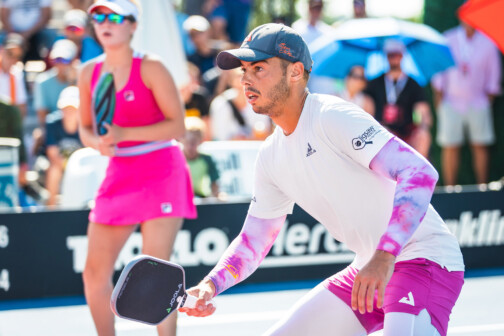
Seven Pros to Watch
According to Dave Fleming, “The Voice of Pickleball”
Ben and Collin Johns
“Ben Johns is one of the GOATs. He is absolutely dominant in singles, mixed doubles, and men’s doubles, which he plays with his older brother, Collin. He’s the smartest player on tour, and he’s also the best player on tour. So not only is he incredibly gifted athletically, but he knows what you’re going to do before you do it some of the time. And that’s extremely frustrating.”
Anna Leigh Waters
“Our best player in the world is 16 years old. That’s crazy. Anna Leigh Waters is an absolute phenom, and her gap to the second player just keeps growing. As we sit here today in July, she has won five consecutive triple crowns. That’s ridiculous. To see what a dominant teenager can look like up close and personal, you’ve gotta get to Brookhaven and see her.”
Lindsey and Riley Newman
“Riley Newman just moved here to The Colony. He would be considered the second-best doubles player in the world, and he’s going to be gunning for the Johns brothers for sure. His sister, Lindsey Newman, moved to Denton. Lindsey is a mom. She doesn’t play as much, but Riley and Lindsey have won a bunch.”
Ivan Jakovljević
“He moves great—a former professional soccer star—so that’s huge. Lefty. He’s really improved to the point of being one of the best players in Dallas and is starting to do damage on the pro tour, so that’s exciting to see.”
Jack Sock
“Jack Sock is legit. Jack and Anna Leigh Waters won [the PPA North Carolina Open in May]. A lot of that has to do with Jack having Anna Leigh as his partner, but a lot of it has to do with Jack being an animal. If you asked any tennis player who you’d want to win one tennis doubles match, they would choose Jack. It’s his timeline—he’s going to be a new dad here at some point—but he is going to come do some damage in pickleball for sure.”
This story originally appeared in the October issue of D Magazine with the headline, “A Dinking Man’s Game.” Write to [email protected].
Author

